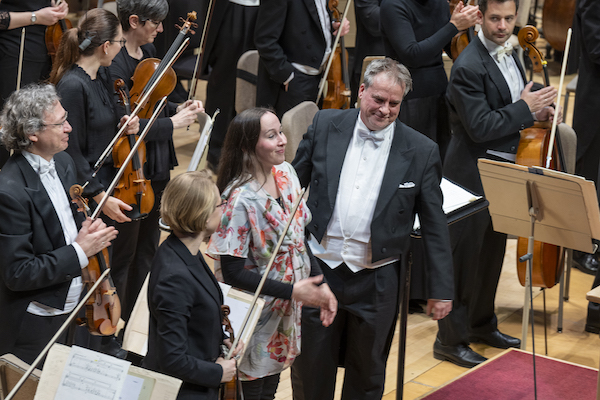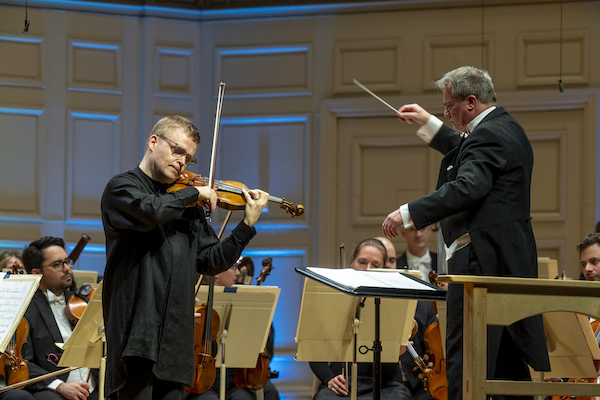Concert Review: John Storgårds opens the BSO’s Music of the Midnight Sun Festival
By Aaron Keebaugh
The Finnish conductor’s welcome return to the Boston Symphony Orchestra heralds the kick-off of a two-week festival of Nordic music.

Composer Outi Tarkiainen and John Storgårds after the Boston Symphony Orchestra’s performance of Midnight Sun Variations. Photo: Michael J. Lutch
Conductor John Storgårds has made it his mission to shed light on little-heard music by composers who need little introduction. The work of Carl Nielsen and Jean Sibelius are his particular specialties. Last weekend, the Finnish conductor made a welcome return to the Boston Symphony Orchestra, heralding the kick-off of a two-week festival of Nordic music that promised to be true to form.
Most tantalizing last Thursday evening was the appearance of a composition from a new face, Outi Tarkiainen. Her Midnight Sun Variations proved to be most tantalizing, making for an alluring introduction to the aptly named “Music of the Midnight Sun” festivities.
Storgårds has championed Tarkiainen’s music over the last several years. The composer dedicated her Midnight Sun Variations to him; and he previously led the work’s premiere with the BBC Philharmonic in 2019. Her score channels a serene, and fittingly Sibelian, imagery, capturing in gossamer tones the long Arctic twilight she experienced during summers at her home in Finland. Gestures rustle and glisten like beams of sunlight over the course of its eleven minutes. Yet she somehow manages to create a simultaneous mood of urgency and stasis. The lines flicker; harmonies crush together with seismic force, all with little large-scale motion beyond these nuanced features. This is very much a composition of our moment: phrases reflect a vitality that churns with seemingly little regard for what is coming ahead. Storgårds and the BSO reveled in every colorful gesture along the way, providing stellar advocacy for the composer whose music was being heard for the first time in Symphony Hall.
The evening’s other debut was a twofer. Violinist Pekka Kuusisto teamed up with the BSO for a true rarity: the orchestra’s first performance of Nielsen’s Violin Concerto, which was composed in 1911. Though less familiar than Sibelius’s work in the genre, the Nielsen nonetheless emanates enough bold exuberance and flash and dazzle to make it memorable.
Unfortunately, last Thursday’s performance failed to deliver the piece’s requisite zest. While the distance and delicacy Kuusisto conjured from his 1709 “Scotta” Stradivarius served the score’s mystery and subtlety, its fiery passages were left unignited. Too often Kuusisto’s playing felt mechanical. Sure, the notes were there, but there was little direction or momentum in how he relayed them.

Pekka Kuusisto performs the Nielsen Violin Concerto with John Storgårds and the BSO. Photo: Michael J. Lutch
Even the accompaniment Storgårds drew from the orchestra faltered quizzically, lacking finesse and polish. Attacks in the quiet passages were often tentative — even ragged — as if the orchestra were being tempered to meet its soloist rather than requiring him to rise to the challenge. In effect, this was less a heroic journey than a bumpy walk through the weeds.
Kuusisto’s encore of a traditional Finnish fiddle tune, however, generated some long-awaited excitement. And Storgårds’s reading of the Sibelius tone poems also helped correct the evening’s imbalances.
The Oceanides can easily stand as Sibelius’ answer to Debussy’s La Mer — in each, phrases teem with energy. Storgårds probed the darkness and gravity of the piece from its opening passages, which gradually churn and flow on their way to vital life. Balances were pristine: the brasses sounded full without overpowering the woodwinds and strings. And the silvery sonic distance the conductor conjured from the cellos resonated with a mesmerizing intimacy. This was an ocean portrait of colorful and rapt ebb and flow.
The Bard has been played less often around these parts. But this eight-minute score conveys soft consolation through its dialogue between harp and orchestra. On Thursday, BSO principal harpist Jessica Zhou struck a consummate bardic presence as she unspooled golden strands of melody against the shadowy winds and strings. Storgårds carefully sculpted every lyrical turn, the music lingering in all the right places.
Tapiola concluded the program by staging a dramatic play between various shades of light. Storgårds’ bold direction painted an eerie but inviting depiction of ancient Nordic forests, a place whose harmonies glimmered like sunlight through clouds, whose phrases pulsated with an animalistic verve. Nature, as this vivid portrait suggests, may at times be threatening. But Storgårds and the BSO proved that it can glimmer beautifully — when viewed from the right distance.
Aaron Keebaugh has been a classical music critic in Boston since 2012. His work has been featured in the Musical Times, Corymbus, Boston Classical Review, Early Music America, and BBC Radio 3. A musicologist, he teaches at North Shore Community College in both Danvers and Lynn.
